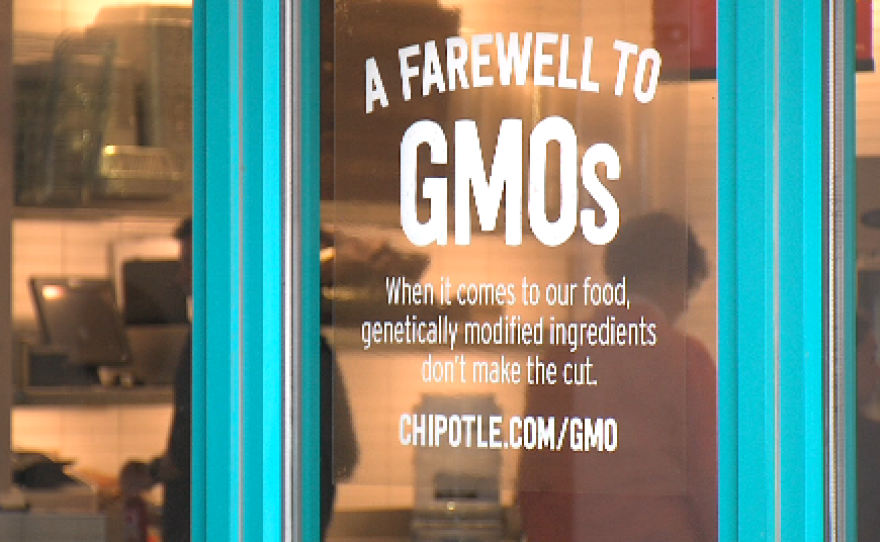On a half acre plot of land in Ramona, Jim Radtke walks through neat little rows of canola. He's not a farmer, but part of his job is to oversee this farm.
"I'm vice president of product development at Cibus," he said. "Which means I'm in charge of plants."
Cibus is a San Diego-based biotech company developing new ways to genetically engineer crops, without producing so-called GMOs. They're hoping to cater to growing demand for food free of genetically modified organisms, while still creating crops that benefit from genetic engineering.
Radtke said the canola growing on this farm is modified to withstand a certain class of herbicides. He keeps each strain under a fine mesh netting to prevent bees from cross-pollinating the different varieties.
"It could create problems at harvest if you had a mix," he said. "So you want to keep them pure."
Radtke has to cut open the net to inspect the canola pods, which look kind of like pea pods, only skinnier. He snaps a pod off the stalk and opens it up.
"They're pretty small right now, but you can just see the small seeds that are formed in there,"
he said.
Crush those seeds, and you get canola oil. Nearly all the canola oil in U.S. grocery stores comes from transgenic plants. That means a gene from some other species, often a bacteria, has been inserted into the canola to impart some trait making it easier for farmers to work with.
Cibus alters canola DNA to produce beneficial traits too, but not through transgenics. They send a molecular messenger into the plant's DNA, conscripting the canola's own DNA-fixing enzymes into changing a gene. That messenger dissolves after its job is done, leaving no foreign genetic material in the finished crop.
Radtke says the Cibus approach isn't genetic modification, it's genetic editing.
"Really, it creates mutations not unlike those you're going to find in nature," he said. "If you looked through million of canola plants, you'd find the same changes that we are making. We just do it in a controlled way, and a lot faster."
Farmers are already growing one strain of Cibus canola commercially. The company hopes to bring other gene-edited crops to market and appeal to growing demand for non-GMO ingredients.
"We all understand GMO to be transgenic," said Radtke. "And as such, we're not GMO."
Walk into the Chipotle on the San Diego State University campus, and you can't miss the new signs bidding "farewell to GMOs." The burrito chain recently said it's taking genetically modified ingredients off the menu.
That decision appealed to many of the students grabbing lunch at the SDSU Chipotle, but when asked what a GMO is, different customers had very different answers.
"My definition of a GMO is a genetically modified organism which is implanted in the crops across America and used either to produce more quantity or better fruiting plants and vegetables," said Douglas Brantley.
"I define GMO as pretty much anything we eat, because we have been eating essentially GMOs as far as there has been agriculture," said Adrian Arrieta.
"I'm really indifferent about it so I'm not sure," said Audrey Malbog.
Maarten Chrispeels, a UC San Diego professor emeritus and an expert on GMOs, says there is no one right answer to the question of what a GMO is.
"A GMO is what you want a GMO to be, I guess," said Chrispeels. "There is actually no universally accepted scientific definition of a GMO."
Chrispeels says scientists often understand GMOs differently from the politicians legislating them; regulators have one definition of GMO while activists have another.

The U.S. Department of Agriculture has told Cibus their canola doesn't have to be regulated as a GMO. Even in GMO-averse Europe, German food safety officials have classified Cibus canola as non-GMO.
However, an independent voluntary labeling organization called the Non-GMO Project told KPBS that Cibus canola is ineligible for their stamp of approval.
Jim Radtke said whatever you call Cibus canola, it represents the next step in genetically engineered crops.
"If we have a technology that can actually be more precise, that can give us exactly what we want, why wouldn't we move in that direction?," he said.
An overwhelming majority of scientists say GMOs are safe to eat, and Radtke agrees. Before coming to Cibus, he worked on transgenic crops himself.
Even if transgenic food poses no threat to human health, Radtke said it's getting shut out of a market Cibus is positioned to corner.
"There's still a lot of people that, right or wrong, say well, we want non-GM products," he said. "We have a technology that will help deliver that. We're meeting a market need."







